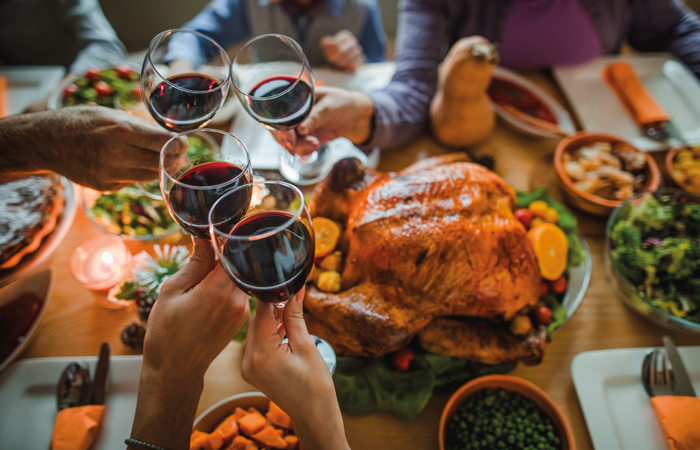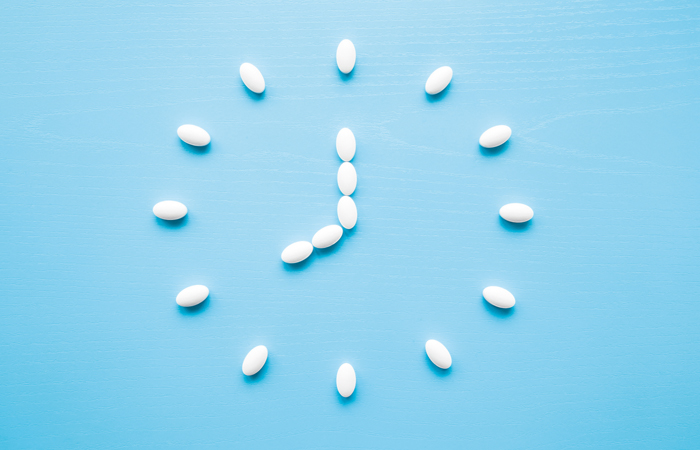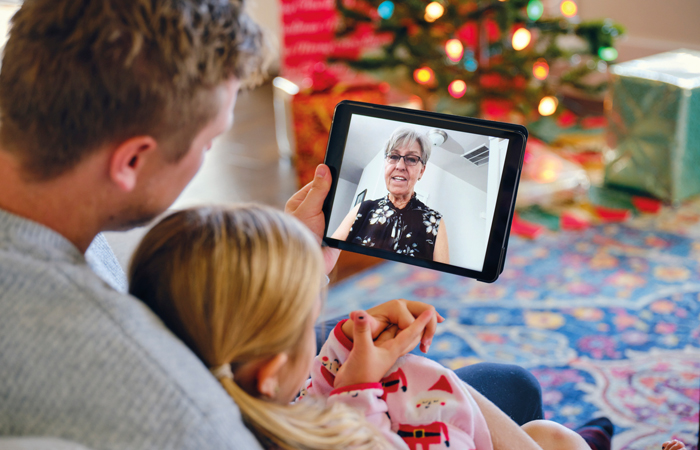In Conditions
Follow this topic
Bookmark
Record learning outcomes
The chestnuts are roasting on an open fire and Jack Frost is nipping at your nose, so it can mean only one thing: the festive season is here. But with all the fun and frivolity that brings, there are countless health considerations in the mix as well.
Throughout Diwali, Hanukkah, Christmas and other seasonal celebrations, as well as in the run up to New Year, pharmacy teams can be on hand to ensure customers are prepared. Offering top tips and recommendations for warding off winter viruses, preventing and combatting the effects of overindulgence and keeping on top of other common ailments are all key.
Covid-19
The festive period is set to be a little different this year. There’s no guessing what the Government’s rules will be surrounding household mixing – at the time of writing, the month-long national lockdown in England has just begun. But while the promise of being home for Christmas à la Bing Crosby (or Michael Bublé, depending on your frame of reference) may not be one that can be made by everyone this year, one thing is for certain: the rules surrounding Covid-19 symptoms and self-isolation will remain. The main symptoms are:
- A high temperature – feeling hot to the touch on the chest or back. Taking a temperature with a thermometer is not required
- A new, continuous cough – defined as coughing a lot for more than an hour, or three or more coughing episodes in 24 hours. If someone usually has a cough, it may be worse than normal
- A loss or change to the senses of smell or taste – not being able to smell or taste anything, or things smelling or tasting different to normal.
Most people with Covid-19 have at least one of these main symptoms and if anyone is showing one or more, they need to be tested for the virus as soon as possible. They must isolate at home, other than to get their test, for at least 10 days.
Anyone they live with, or anyone in their support bubble, should isolate for 14 days if they have been in close contact with them since their symptoms started, or during the 48 hours before they started. This 14-day isolation is also the case for anyone who has been told to self-isolate by NHS Test and Trace.
Heartburn and indigestion
Heartburn and indigestion are prevalent at this time of year, even in people who have never experienced these symptoms before.
- Heartburn – also known as acid reflux – is characterised by a burning pain behind the breastbone
- Indigestion – also known as dyspepsia – is characterised by pain in the upper abdomen, belching, nausea and a feeling of fullness. Symptoms often come and go rather than being present consistently.
Generally nothing to worry about, they are usually caused by a change in lifestyle habits. Eating too much or too quickly; eating spicy, fatty, or rich foods; smoking; alcohol; and certain types of medication, such as non-steroidal anti-inflammatory drugs (NSAIDs), can all trigger heartburn and indigestion.
Making further lifestyle changes can help, such as avoiding the trigger food types mentioned, exercising and quitting smoking. Even measures such as reducing stress levels, sitting more upright during and after meals and raising the head off the bed slightly when sleeping can help.
If these lifestyle changes don’t work, customers may ask about over-the-counter (OTC) remedies. For rapid relief, there are several options: antacids neutralise stomach acid, although they are short-acting and so repeat doses may be required. Alginates form a ‘raft’ that floats on top of the stomach’s contents, helping to prevent acid escaping into the oesophagus.
If antacids or alginates do not help to reduce symptoms, H2-agonists such as ranitidine can be used. These inhibit the production of acid in the stomach lining for up to 12 hours’ relief, but should only be used for a few days. Proton pump inhibitors (PPIs) inhibit the production of stomach acid, starting to work in a couple of hours and building to a maximum effect after two to four days. These are intended for short-term use.
Products are available as tablets or liquids. Liquids may have a faster onset of action, but tablets can be more convenient so the customer’s preferences and needs will need to be considered when helping them to select the most appropriate product.
Note that recurring indigestion can be a sign of a more serious problem, such as a stomach ulcer, hiatus hernia, Helicobacter pylori infection, or even certain types of cancer. Other red flags include blood in stools, difficulty swallowing, recurrent vomiting and weight loss. Customers experiencing any of these symptoms should be referred to the pharmacist.
Reaching for the remote
The cold, dark winter months can prevent people getting out to exercise as much as they should. It is important to remind customers that regular exercise is beneficial for both physical and mental health, especially during a second lockdown.
-
Exercise
Adults should take part in at least 150 minutes of moderate-intensity activity, or 75 minutes of vigorous intensity, per week, in line with national recommendations. This doesn’t mean they have to complete a weekly marathon or spend hours in a gym, they can start by reaching a target of 10,000 steps a day and then improving on this. “If new to exercise, it is important to slowly increase the level to avoid initial pain, so setting realistic and achievable goals is vital,” explains Dr Wendy Holden, consultant rheumatologist at North Hampshire Hospitals NHS Foundation Trust, and the charity Arthritis Action’s medical advisor. “An ideal plan should include aerobic exercise to improve cardiovascular fitness, resistance exercise to improve muscle strength, and flexibility exercises to maintain suppleness.”
Not only will exercise keep customers fit and healthy, it can also help to relieve stress and anxiety, improve mood and even encourage better sleep. Pharmacy teams can suggest NHS recommended apps available to help customers get into exercising.
Signposting suggestion: NHS Couch to 5K
-
Joint pain
Approximately 10 million people in the UK have arthritis or similar joint conditions, according to the NHS. Stiff and sore joints may make people want to slow down and sit on the couch for yet another viewing of a Christmas TV special. But actually, gentle exercise is recommended to those suffering from joint pain to prevent joints becoming stiffer over time.
“Staying active is essential for people living with arthritis. Simple exercise improves muscle strength, which can be just as effective for pain as prescription painkillers,” says Dr Holden. “They also help improve balance and function, keeping people independent and sometimes delaying the need for surgery for much longer.”
Although there is no cure for joint pain such as arthritis, there are ways to manage pain that can be purchased within the pharmacy. Pharmacy teams can recommend cold and heat therapies and topical and oral analgesics, where appropriate. Physical aids, such as walking sticks, can also be recommended as necessary.

Immune system
A well-functioning immune system is key to providing a robust defence against all kinds of pathogens, including colds, flu, norovirus and cold sores, all of which are common at this time of year.
Norovirus, also known as the winter vomiting bug, causes vomiting and diarrhoea that usually lasts for a couple of days. A high temperature, headache and aching arms and legs can also be experienced. As it’s highly infectious, people should stay off work or school when symptoms start, until two days after they stop.
Doing plenty of exercise, getting enough sleep, limiting alcohol intake, stopping smoking and maintaining a healthy weight can all help, as can that all-important habit of washing hands regularly and thoroughly. Hands should be washed for around 20 seconds – or the length of time it takes to sing “Happy Birthday” twice – ensuring that all areas are properly cleaned, including between the fingers and under the nails. Note that alcohol hand gel does not kill norovirus.
While there is no food or nutritional supplement that will stop a person catching an infection, as that’s about exposure, diet and nutrition do have a role. Eating plenty of fruits, vegetables and wholegrains can ensure an adequate nutrient supply, which in turn can help to balance the immune system and give it the best chance of warding off infection more quickly.
See our Professional Assistant module on the common cold for more on managing colds and flu, and winter skin and scalp problems for more on cold sores.
Self control
Eating a healthy diet and appropriate portion sizes can help in avoiding heartburn and indigestion, providing much-needed energy and balancing the immune system. But it’s also crucial for weight management, particularly at a time of year when piling on the pounds is common.
-
Festive feasting frenzy
It is estimated that people will eat between 5,000 and 6,000 calories on Christmas Day alone, including 190g of fat. This calorie count is up to three times the recommended daily guideline for women and double that for men and, as for the fat, it’s an astonishing amount when the recommended daily guideline is 30g for men and 20g for women. As a result, people can gain, on average, 1kg or 2lbs during the festive season.
This is not to say that festive foods can’t be enjoyed, but pharmacy teams can advise customers that eating a little of what they fancy, rather than a binge session of festive foods, is the best course of action. It’s all about indulging not overindulging, eating in moderation and balancing food intake with adequate amounts of exercise. Not only will this help in avoiding excessive weight gain, it may also prevent people from resorting to crash diets in the new year.
-
Cheers to that
Moderation is also key when it comes to festive tipples. Despite what some may argue, the guidelines of no more than 14 units a week spread out over three or more days and with at least two alcohol free days, still stand at this time of year.
Measuring spirits rather than free-pouring, opting for smaller volumes such as bottled beer over pints, and diluting wine or beer with soda or lemonade to make a spritzer or shandy are all ways to reduce alcohol intake. In addition, alternating alcoholic drinks with water or other non-alcoholic alternatives is a good idea as this will also keep the body hydrated, helping to reduce the effects of a hangover, too.
It’s also worth remembering that alcohol contains a surprising number of calories and a lot of sugar and can stimulate appetite, as well as potentially weakening the resolve not to overindulge. Therefore, the wider knock-on effect of alcohol on diet and weight is considerable.
Alcohol can also have a negative impact on sleep. While it can help people to drift off more easily initially, it tends to result in a lighter and more fitful sleep, meaning people wake up less rested – yet another reason not to drink too much.

Tummy troubles
A change in diet over the festive period can cause digestive issues such as constipation and diarrhoea.
-
Constipation
Constipation is characterised by not passing stools as frequently as usual and/or straining to pass stools. It can also cause bloating, wind and abdominal discomfort. Common causes include a lack of dietary fibre, irregular meal times, reduced liquid intake, limited physical activity and changes in daily routine, as these can all slow down the bowel.
Dietary changes should be attempted first, increasing fibre and fluid intake and taking gentle exercise. Adults should aim to consume around 30g fibre per day and six to eight glasses of fluid. If these don’t improve symptoms, OTC laxatives – stimulant, bulk-forming or osmotic – are available that may be recommended short-term, based on the individual customer’s needs.
-
Diarrhoea
Poorly cooked food, especially the Christmas staple of turkey, plus badly stored leftovers and their questionable reheating can all increase the growth of bacteria, putting people at risk of diarrhoea and sickness from food poisoning.
Symptoms include nausea, diarrhoea, vomiting, stomach cramps and high temperatures of over 38°C. Symptoms should pass within about a week. Customers can be advised to sip water as much as possible to prevent dehydration and eat small, bland meals such as toast, bananas and crackers rather than avoiding eating, as this can speed up the recovery process.
Oral rehydration solutions, which replace fluids and salts, can be recommended. If adult customers can’t wait for diarrhoea to pass, they can try loperamide, if appropriate, to slow down the passage of food in the intestines.
Medication
When it comes to medication adherence, people can find it tricky to remember to take their medicines at the best of times, let alone during the festive season, so preparation is the name of the game.
Pharmacy teams can offer some top tips to help people remember, such as organising medication into daily or weekly pill boxes, setting reminder alarms at the correct times, or keeping a medication diary to monitor what they need to take and when.
If prescription medicines are required, customers should be advised to order repeat prescriptions in good time so that they have enough of their medication to see them through the festive pharmacy closures. With a second national lockdown underway, individual pharmacies will be able to advise customers on the best course of action for obtaining their prescriptions based on their dispensary’s workflow.
It's also a good idea for customers to stock up on over-the-counter products such as first aid supplies, indigestion remedies and painkillers for all those overindulgences and unexpected mishaps. First aid tips can also be shared in order to help prevent unnecessary trips to hospital, which is especially important this year during the Covod-19 pandemic.
“Knowing how to treat a burn from cooking or a sprained ankle is vital as it means minor injuries can be dealt with at home but acting fast with first aid can also save lives. Having the confidence to take swift action, for example if a loved one is choking or has a cardiac arrest, can help avoid a tragedy at what is supposed to be the most wonderful time of the year,” says Dr Lynn Thomas, medical director at St John Ambulance. “Always dial 999 in an emergency but equipping yourself with some first aid skills can also help you identify when to seek medical attention. No one wants to end up in hospital, especially at Christmas.”
Ensuring customers and patients are aware of when the pharmacy is open during the festive season is important, so advertising opening times is crucial. This may be through strategically-placed posters around the pharmacy, flyers given out with prescriptions, or on the pharmacy’s website and social media pages.

Allergies
Fetching last year’s dusty festive lights down from the attic, heading to a relative’s pet-friendly house, or sharing a living space with a real Christmas tree can be triggering for those with allergies.
However, they can be tackled, to an extent, with regular cleaning. Pharmacy teams can recommend customers with allergies use a vacuum cleaner fitted with a high-efficiency particulate air (HEPA) filter, as these can trap more dust particles. A wet cloth can be recommended for wiping surfaces, as this also helps to trap dust and prevents it spreading in the air.
Towels, sofa cushions and bedding should be washed at a high temperature to help remove dust and pet dander, and allergy-proof covers can also help. Pharmacy teams can recommend that pets be prevented from climbing onto beds and sofas and be regularly groomed, preferably outside, to keep on top of dander. Air filters can help improve the air quality inside, but can be a more expensive option.
Customers can purchase antihistamines from a pharmacy if they’re struggling to get on top of their symptoms. Pharmacy teams should be aware of the different types available to help customers choose the most appropriate product for their needs.
-
Food allergies
Customers with food allergies will be used to checking ingredient labels, but may have to take extra precautions if someone is cooking for them over the festive period. It is important to clearly communicate a food allergy in advance, just to be on the safe side.
In addition, if a customer’s allergies are severe enough to cause anaphylaxis, they may be prescribed an adrenaline auto-injector, such as EpiPen. It is recommended that people with severe allergies carry two in-date adrenaline auto-injectors wherever they go. They should ensure they show their friends and family how to use it in case of an emergency.
Stress, social isolation and SAD
In 2019, suicide rates among men and boys were the highest since 2000, at 16.9 deaths per 100,000. The suicide rates for women and girls were the highest since 2004, at 5.3 deaths per 100,00 in 2019, according to data published by the Office of National Statistics. Pharmacy teams are in an ideal position to help customers experiencing mental health problems. See more on on suicide prevention.
Pharmacy teams are in an ideal position to help customers experiencing mental health problems. When it comes to stress, they can pass on the NHS’ 10 stress busters to help people manage it:
- Get active – exercise is a great stress buster
- Take control – actively finding a solution to a problem can help people feel more in control
- Connect with others – combat isolation by sticking to routines, maintaining an active mind and keeping in touch with people over the phone and online
- Self care – socialising and relaxing away from work can help people unwind
- Up for the challenge – setting realistic goals can encourage focus and feelings of accomplishment
- Avoid unhealthy habits – drinking too much and smoking should not be used as coping mechanisms
- Help others – this can lead to a sense of achievement and encourage social engagement
- Work smarter, not harder – prioritise what is really important
- Engage in positivity – this may be difficult, but taking time to stop and think positively about things can help reduce negative thoughts
- Accept things you cannot change – it is important for people to concentrate on the things they have control over.
-
Social isolation
The first lockdown already established feelings of isolation and loneliness, especially in older people and those that live alone, and the holidays can be a lonely time too. But there are tips pharmacy teams can pass on to help combat such feelings. Sticking to a routine can bring structure to long days inside as can played activities to keep the mind happy, like painting or reading a book. Staying active, even indoors, can be a healthy activity to start with. Calling relatives and staying in touch with friends can help people feel connected to others too.
-
SAD
Seasonal affective disorder (SAD), also known as winter depression, usually affects people in the winter months when the days are colder and darker. A lack of sunlight has been thought to affect the body’s production of melatonin and serotonin, affecting mood.
Symptoms include low mood, irritability, a lack of energy, sleeping for longer, feelings of guilt and a lack of pleasure in daily activities.
There are lifestyle measures that can help including getting as much natural sunlight as possible by opening curtains and going out in the day time.
Exercise can help achieve this too through lunchtime walks, and help the mind de-stress. Talking therapies may also be beneficial for some customers.


